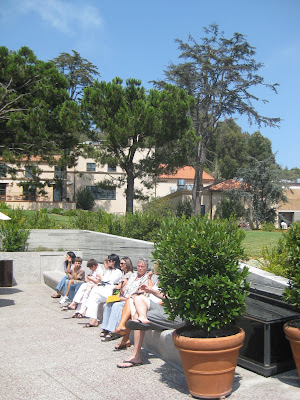"How about Middle Eastern food?" the tutor said. "What do you think can be included in Middle Eastern food?"
"Hmm," the student thought about it for a few second. "I don't go to Middle Eastern restaurant often. What country is Middle Eastern?"
"Well, I think Iran, Iraq, Saudi Arabia..."
"Oh, that's dangerous!"
"You think it's a dangerous area?"
"Yeah. Terrorist country!"
The tutor looked at me and we just had to laugh. The naivety in her words made it easier to do so, but I was feeling embarrassed as another Japanese person and conflicted as a teacher-to-be.
When I was tutoring, too, sometimes my students said things that made me feel this way. A few times I tried "poking" them a little ("If we allow gay marriage, they spread AIDS." "Really? How do they do that? Can you explain?"), but when their only response was a blank or completely puzzled stare, I sort of gave up and let it go. My excuse was that our focus was the language; we shouldn't be carried away with discussing the content, for it might make them forget about language accuracy. But letting go always involved a feeling of guilt, as if I weren't doing my job properly. Maybe I wasn't. I don't know. When what you teach is language, a tool to communicate, to express ideas, do you have any say about what the students choose to do with the tool?
Some of the things that have been said, though, are wrong. Not just inappropriate, but wrong. Wrong in that they label and define others in a negative way; wrong in that the utterer, with such innocence, isn't questioning what they are saying at all. It's just a fact for them; just as "Summer is hot," "Middle eastern countries are terrorist countries."
I wonder if it would be right to leave the student saying what I feel is wrong. Would it be neglecting the student in some way? But then, when a student says something like that in perfect English, as a language teacher, what would I do? All I would do, probably, is just say, with as much doubt as possible, "Really?", swallowing the hint of guilt I'd be feeling.















